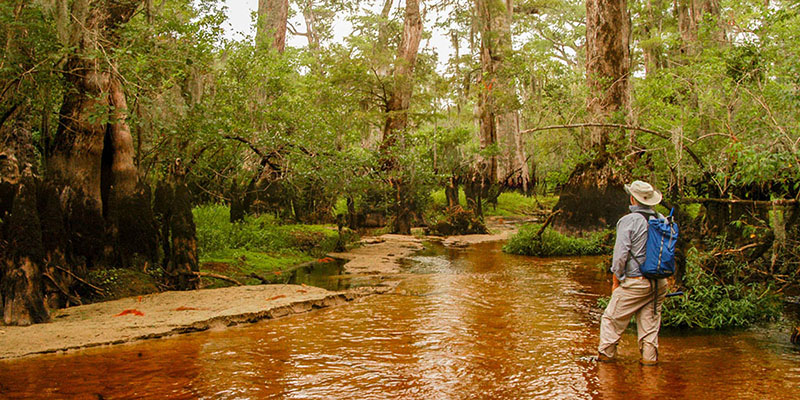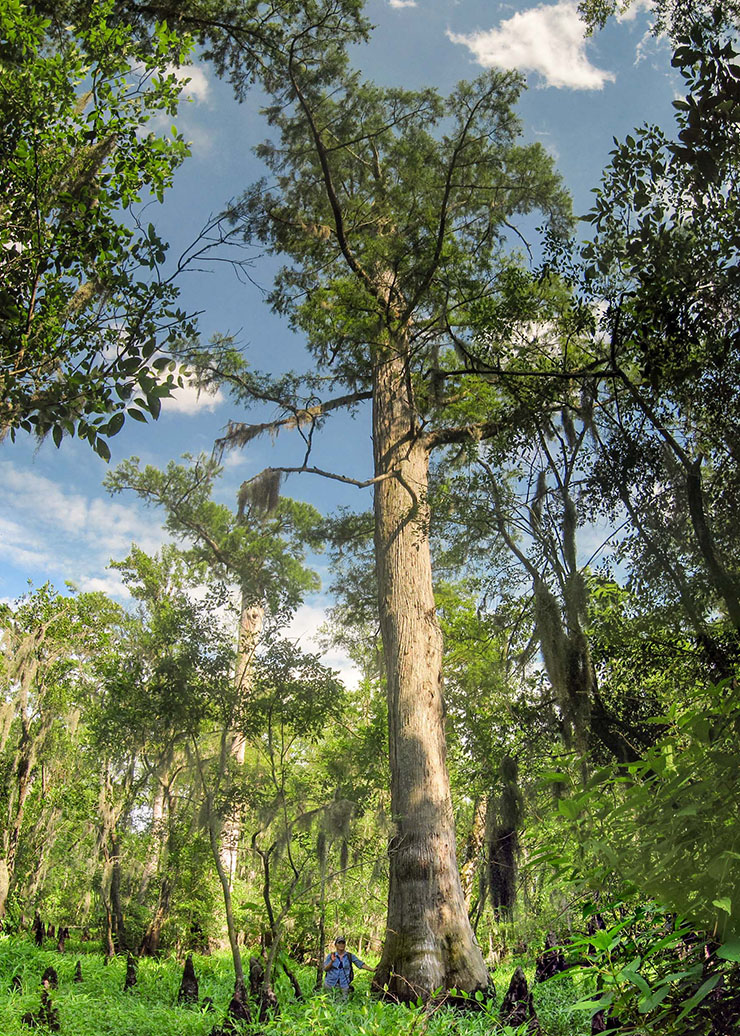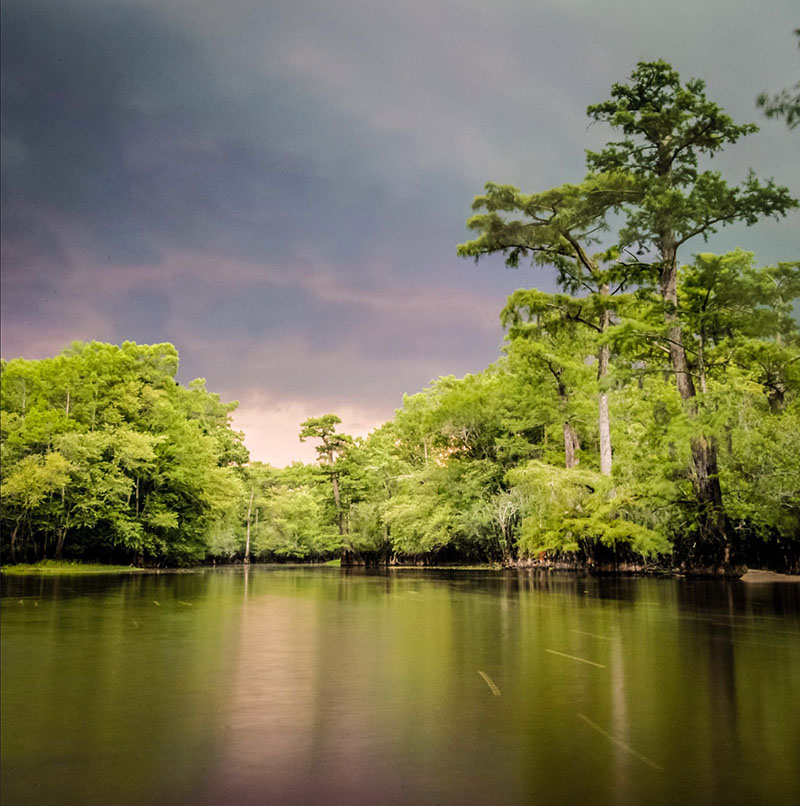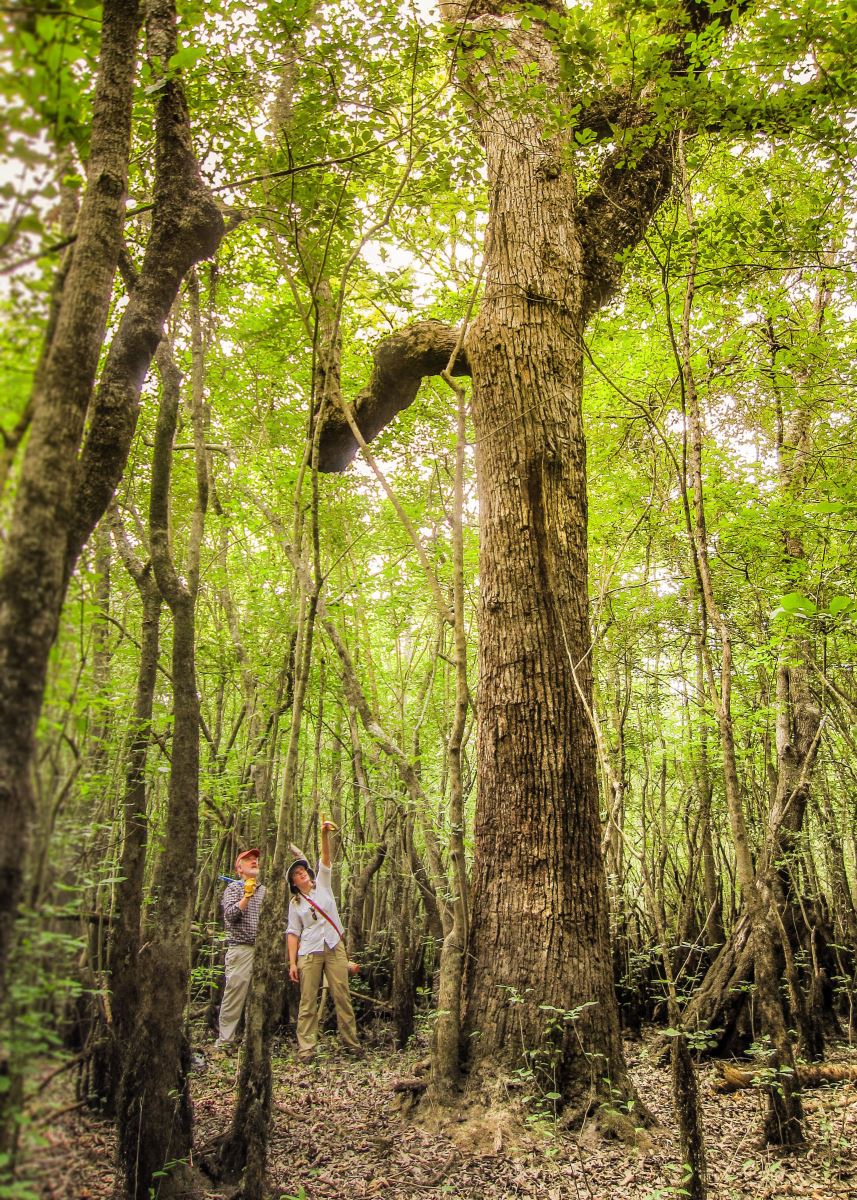Researchers Document the Oldest Known Trees in Eastern North America
FAYETTEVILLE, Ark. – A recently documented stand of bald cypress trees in North Carolina, including one tree at least 2,624 years old, are the oldest known living trees in eastern North America and the oldest known wetland tree species in the world.
David Stahle, Distinguished Professor of geosciences, along with colleagues from the university’s Ancient Bald Cypress Consortium and other conservation groups, discovered the trees in 2017 in a forested wetland preserve along the Black River south of Raleigh, North Carolina. Stahle documented the age of the trees using dendrochronology, the study of tree rings, and radio carbon dating. His findings were published May 9 in the journal Environmental Research Communications.
The ancient trees are part of an intact ecosystem that spans most of the 65-mile length of the Black River. In addition to their age, the trees are a scientifically valuable means of reconstructing ancient climate conditions. The oldest trees in the preserve extend the paleoclimate record in the southeast United States by 900 years, and show evidence of droughts and flooding during colonial and pre-colonial times that exceed any measured in modern times.
“It is exceedingly unusual to see an old-growth stand of trees along the whole length of a river like this,” Stahle said. “Bald cypress are valuable for timber and they have been heavily logged. Way less than 1 percent of the original virgin bald cypress forests have survived.”

Black water, white sand and millenia-old trees at Black River.
Stahle has been working in the area since 1985, and cataloged bald cypress trees as old as 1,700 years in a 1988 study published in the journal Science. His work helped preserve the area: 16,000 acres were purchased by The Nature Conservancy, a private land-conservation group that keeps most of its holdings open to the public.
“Dr. Stahle’s original work on the Black River, which showed trees dating from Roman times, inspired us to begin conservation on the Black more than two decades ago,” said Katherine Skinner, executive director of The North Carolina Chapter of The Nature Conservancy. “This ancient forest gives us an idea of what much of North Carolina’s coastal plain looked like millennia ago. It is a source of inspiration and an important ecosystem. Without Dr. Stahle, it would have gone unprotected and likely destroyed.”
For the newest study, researchers used non-destructive core samples from 110 trees found in a section of the wetland forest they had not previously visited. “The area of old growth bald cypress was 10 times larger than I realized,” Stahle said. “We think there are older trees out there still.”

A huge cypress tree at Black River. Photo by Dan Griffin.

Ancient blad cypress trees line the Black River in North Carolina. Photo by Dan Griffin.
 An old overcup oak, also along the Black River. Photo by Dan Griffin.
An old overcup oak, also along the Black River. Photo by Dan Griffin.
About the University of Arkansas: The University of Arkansas provides an internationally competitive education for undergraduate and graduate students in more than 200 academic programs. The university contributes new knowledge, economic development, basic and applied research, and creative activity while also providing service to academic and professional disciplines. The Carnegie Foundation classifies the University of Arkansas among fewer than 2.7 percent of universities in America that have the highest level of research activity. U.S. News & World Report ranks the University of Arkansas among its top American public research universities. Founded in 1871, the University of Arkansas comprises 10 colleges and schools and maintains a low student-to-faculty ratio that promotes personal attention and close mentoring.
Topics
Contacts
David Stahle, Distinguished Professor, Geosciences
J. William Fulbright College of Arts and Sciences
479-575-3703,
dstahle@uark.edu
Bob Whitby, feature writer
University Relations
479-575-4737,
whitby@uark.edu
Headlines
Affairs of the Heart
Find out how biomedical engineering professor Morten Jensen is developing innovative devices to produce better outcomes in cardiovascular medicine.
Students, Faculty and Alumni Kick Off Centennial Year of School of Law
Founded April 14, 1924, the School of Law faculty, students and alumni started the celebration of its centennial year with a Founders Day event and will continue with more commemorative events this coming fall.
Yearly Academic Award Winners, Ambassadors Recognized by Bumpers College
Schyler Angell, Lexi Dilbeck, Cason Frisby, Tanner Austin King, Anna Brooke Mathis, Carrie Ortel, Lucy Scholma, Kadence Trosper and student ambassadors were honored at the college's annual reception.
World Premiere of 'Cries from the Cotton Field' Slated for May 8
Cries from the Cotton Field chronicles the journey of 19th century Italian immigrants from northern Italy to the Arkansas Delta and ultimately to Tontitown. It will premier at 6 p.m. May 8 in Springdale Har-Ber High School.
Fay Jones School's Earth Day Event Spotlights Sustainable Materials and Projects
"One day doesn't seem like a lot, but one day can empower individuals and groups, energize them to work for change and innovate for transformative solutions," professor Jennifer Webb said of the students' design work.





